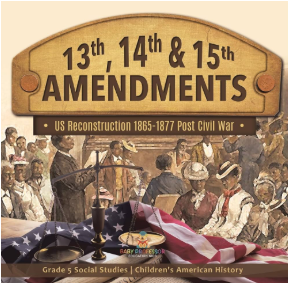Rights for Birthright
The Legacy of Abraham Lincoln and the Role of Abolitionists and the Radical Republican Party in Advancing African-American Civil Rights
Today, the news is ablaze with commentary on moves to abolish birthright citizenship in the United States through an executive order. Birthright citizenship is a right guaranteed by the United States Constitution and cannot be eradicated by executive order. At this challenging time, it is important to know your rights as well as the responsibilities of good citizenship. Therefore, I thought it was only fitting and proper to share this background on the 13th and 14th Amendments of the United States Constitution.
The legacy of President Abraham Lincoln remains a pivotal chapter in the history of the United States, particularly regarding the abolition of slavery and the advancement of civil rights for African Americans. His vision for a nation free from the shackles of slavery culminated in the passage of the 13th Amendment, which abolished slavery in 1865. However, Lincoln's efforts were just one part of a larger struggle that involved Radical Republicans*, abolitionists, and legal battles such as the Dred Scott Decision, which starkly highlighted the systemic injustices faced by African Americans.
Lincoln's presidency coincided with a tumultuous period in American history. The Civil War was not only a battle to preserve the Union; it was also a moral crusade against the institution of slavery. In his Emancipation Proclamation of 1863, Lincoln took a bold step by declaring freedom for slaves in Confederate states. This foundational act transitioned the war into a fight not just for national unity but for human rights. However, the Emancipation Proclamation was initially limited in scope, and the passage of the 13th Amendment was essential to ensure that slavery was unequivocally abolished throughout the entire nation. Lincoln's strong advocacy for the amendment demonstrated his commitment to the cause, and his leadership played a critical role in garnering the necessary support for its passage through Congress.
Simultaneously, the Radical Republican Party emerged as a powerful force in advocating for the rights of freedmen. Members such as Thaddeus Stevens and Charles Sumner fervently championed civil rights legislation, viewing the inclusion of African Americans in the fabric of American society as both a moral imperative and a political necessity. Following the Civil War, the Radical Republicans pushed for the 14th Amendment, which granted citizenship to all individuals born in the United States, thereby directly countering the Dred Scott Decision of 1857. This infamous ruling declared that African Americans could not claim U.S. citizenship and were thus not entitled to the rights and protections under the Constitution. The 14th Amendment, ratified in 1868, fundamentally altered this landscape, ensuring that African Americans were recognized as citizens and afforded equal protection under the law.
Abolitionists like Frederick Douglass and William Lloyd Garrison also played instrumental roles in this fight for equality. Douglass, a former enslaved person, became a leading voice against slavery and for civil rights, utilizing his powerful oratory and writing to advocate for African Americans. His insistence on the fundamental rights of all individuals, regardless of race, resonated with many and helped to galvanize public opinion toward the cause of abolition and civil rights. Garrison, who founded the anti-slavery newspaper "The Liberator," worked tirelessly to mobilize support against slavery, emphasizing the moral duty of Americans to end the institution and recognize the humanity of African Americans.
In conclusion, the intertwined efforts of Abraham Lincoln, the Radical Republican Party, and dedicated abolitionists like Frederick Douglass and William Lloyd Garrison created a formidable movement that sought to dismantle slavery and establish civil rights for African Americans in the post-Civil War era. While the Dred Scott Decision had articulated a grim reality for Black Americans, the subsequent passage of the 13th and 14th Amendments marked a significant triumph in the fight for equality and justice. The legacy of these historical figures demonstrates the power of collective action in the pursuit of human rights and serves as a guiding light for future generations in the ongoing struggle for social justice.
The Radical Republicans were a progressive faction within the Republican Party during the Reconstruction era, fiercely committed to racial equality and justice for newly freed African Americans. They sought not only the abolition of slavery but also the implementation of laws and policies to ensure equal rights for Black Americans, such as the Civil Rights Act of 1866 and the 14th and 15th Amendments. These Republicans were adamant that the South needed to be punished and transformed to prevent the re-establishment of white supremacy. In contrast, modern-day Republicans often emphasize a more conservative, limited-government approach that has evolved in ways that, at times, can be seen as perpetuating racial inequalities. While the modern GOP promotes a vision of individualism and traditional values, its policies around voting rights, immigration, and law enforcement are frequently criticized for disproportionately impacting marginalized communities, particularly people of color.
LAW 101
Birthright Citizenship
As a birthright citizen in the United States, you are granted several key rights under the 14th Amendment of the U.S. Constitution, which automatically grants citizenship to anyone born on U.S. soil. Here are some of the rights you enjoy:
- Right to Vote: Once you reach the legal voting age (18 years old), you have the right to vote in federal, state, and local elections.
- Right to Work: You can work legally in the U.S. without the need for work permits or visas.
- Right to Apply for Passports: As a U.S. citizen, you can apply for a U.S. passport and travel internationally.
- Right to Equal Protection: You are entitled to equal protection under the law, meaning you cannot be discriminated against based on race, gender, religion, etc.
- Right to Due Process: If you are arrested or detained, you have the right to due process, including the right to a fair trial and protection from self-incrimination.
- Right to Residency: You have the right to live in the U.S. indefinitely, and you cannot be deported unless certain conditions (such as criminal activity) apply.
- Right to Education: You have access to public education from kindergarten through high school, and in some cases, higher education as well.
- Right to Social Services: You are eligible for government benefits, such as Social Security, unemployment, and other social welfare programs if you meet the criteria.
In essence, as a birthright citizen, you have many of the same rights as those who naturalize as U.S. citizens through other means, with the exception of certain positions (e.g., the presidency) that are reserved for natural-born citizens.
If you have questions regarding your rights or immigration status, do not hesitate to call The Law Offices of Gabriel Christian and Associates at 301-218-9400.


